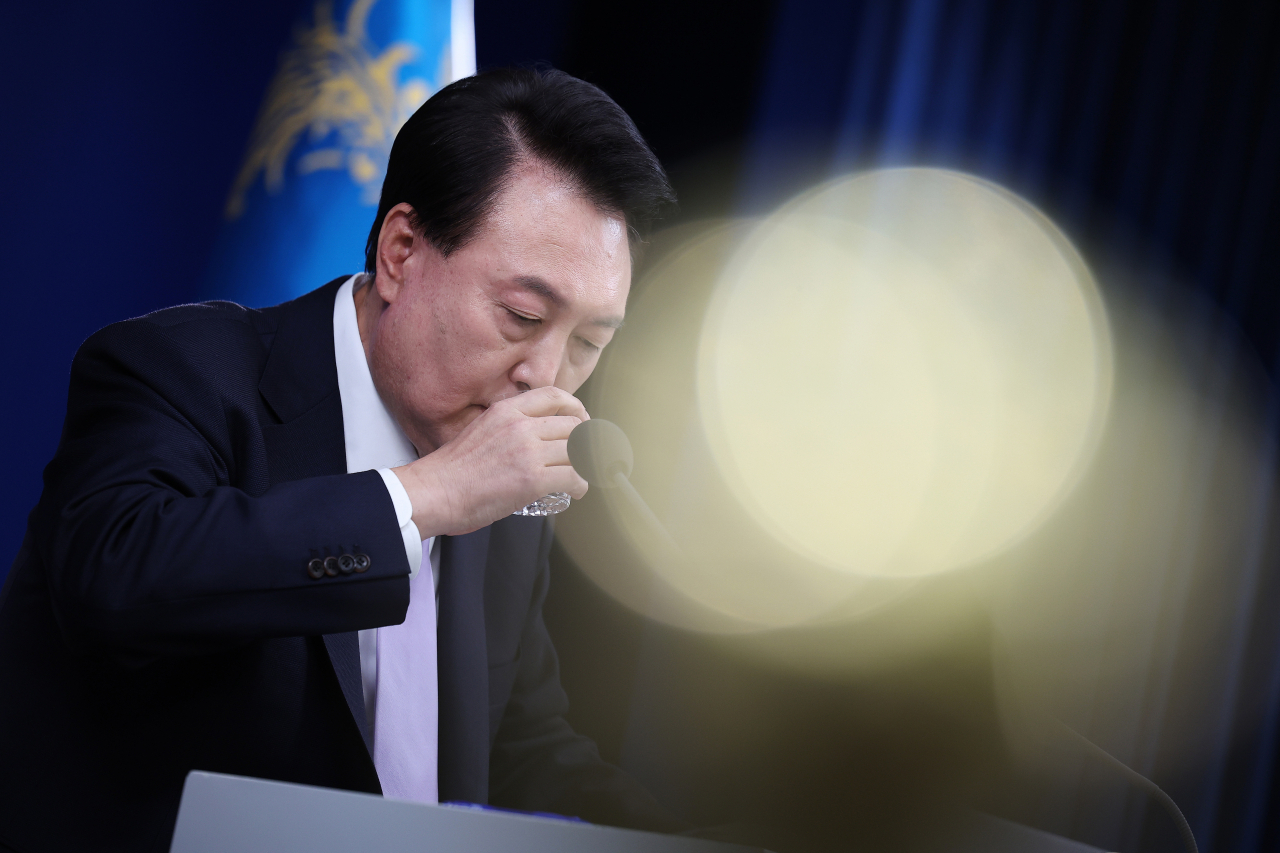
 |
| South Korean President Yoon Suk Yeol takes a sip of water as he attends a press conference on state affairs at the presidential office on November 07, 2024 in Seoul, South Korea. Getty Images |
South Korea's 20th president, Yoon Suk Yeol, has become the country's third leader to face impeachment proceedings in the National Assembly, following former Presidents Park Geun-hye and Roh Moo-hyun.
As Yoon's political future hangs in the balance, the contrasting outcomes of Park and Roh's cases provide a framework for understanding how things might pan out.
The main opposition Democratic Party of Korea and its allied parties plan to bring the impeachment motion against Yoon to a vote on Saturday. The motion, reported to the plenary session at 12:48 a.m. on Thursday, must be voted on 24 to 72 hours later.
The impeachment motion alleges that Yoon’s declaration of martial law, mobilization of armed forces, and attempt to paralyze the functions of the National Assembly constitute “treasonous acts stemming from the dereliction of duties as the head of state and chief executive, who is constitutionally and legally obligated to command the armed forces.”
Initiating a presidential impeachment in South Korea requires a majority vote in the National Assembly, while advancing the motion demands the approval of at least two-thirds of its total 300 members.
Once the motion passes, the president is immediately suspended from exercising their powers until the Constitutional Court reaches a verdict.
Historical precedents: Roh vs. Park
Impeachment motions against Roh in March 2004 and Park in December 2016 were both passed by the National Assembly, but the outcomes were starkly different.
Roh was reinstated in May 2004 after the Constitutional Court dismissed the impeachment charges.
The court concluded that while he had violated Article 9 of the Election Law and his constitutional duty to uphold the Constitution, these infractions did not amount to serious legal breaches justifying his ouster.
As a result, Roh resumed his presidential duties 64 days after his authority had been suspended by the Assembly's impeachment vote.
In contrast, Park was removed from office following the court's ruling in March 2017.
The Constitutional Court upheld Park's impeachment, stating that her actions constituted "grave violations of the law that betrayed the trust of the people and were unacceptable from the perspective of upholding the Constitution."
Suspect status or not
However, the key differences between the two former presidents lie in their status and the nature of the charges brought against them.
Roh faced three allegations, including violations of the Election Act, though these were not formally investigated or substantiated.
The controversy stemmed from Roh’s alleged breach of the constitutional duty to remain neutral during elections, following his remarks endorsing the pro-Roh Uri Party during news conferences ahead of the April 2004 general elections.
Park, however, became the first sitting president in South Korean history to be formally investigated as a suspect in November 2016, prior to the impeachment vote. She faced 13 charges, including bribery, abuse of power, coercion, and the unauthorized disclosure of official secrets, though only some of them were upheld.
Prosecutor-turned-president Yoon is now under scrutiny for alleged constitutional violations.
On Friday, a special investigation unit was launched to probe accusations surrounding Yoon’s declaration of martial law earlier in the week. This marks the first time in eight years that prosecutors have initiated an investigation into a sitting president, the last being the 2016 inquiry into Park.
Role of public opinion
Another key factor that shaped the futures of Roh and Park was public opinion.
While a majority of the public opposed Roh's impeachment, they called for his public apology and expressed their dissent through candlelight vigils.
In contrast, the public overwhelmingly supported Park's impeachment, with massive candlelight protests demanding her removal from office.
Today, a similar wave of public sentiment appears to be building against Yoon.
A public poll conducted by Realmeter on Wednesday revealed that 73.6 percent of respondents supported the impeachment of President Yoon in relation to the martial law situation, while 24 percent expressed opposition.
Candlelight vigils have also reemerged nationwide, with participants calling for Yoon's resignation.









